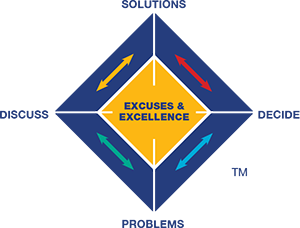Excuses and Excellence
-
-

Each day we can find excuses for not performing well or find ways of trying harder to achieve excellence. These attitudes are formed early in life. Children are creative in finding excuses to watch television or play computer games, rather than concentrating on their homework. The same applies at work, when a person finds an excuse for missing or being late for a meeting, rather than taking responsibility for being on time. Once a pattern develops it is likely to continue.
Look for those who produce excuses rather than excellence. The difference is not just intelligence or skill, but the mindset and direction of the person. The person who provides excuses moves away from achievement. The person who pursues excellence sets task objectives and practises regularly, in order to succeed. In discussions, listen for the words people use. Do they give reasons for failing or do they give evidence of achievement?
-
Madam C.J. Walker

Those who succeed have more than knowledge and skill. They have the key psychology factors - motivation, determination and concentration. Indeed, they often acquire their abilities as a result of their determination and drive to improve.
Sarah Breedlove, who changed her name to Madam C.J. Walker, was born into a slave family in the USA, during 1867. Although slavery was being abolished, she had major problems, including the death of her mother and father when she was only five years of age. With little education, she had a tough life and got married at the age of 14. She had a daughter, but her husband died when she was 20, leaving her a single, unemployed parent.
Rather than make excuses, Sarah decided to make a success of her life and took on various jobs before founding her own beauty and hair care products. She strove for an achieved excellence and helped many other women to do the same. Her charitable work for the YMCA and National Association of Colored Women, plus education and other organizations, was an indication of her outstanding public contribution. In this audio article, we can hear her story of being an exemplar and an achiever of excellence.
-
Applications

It is interesting to count during any one day, how many excuses you hear. Also, count how many times the people that you meet mention their efforts to achieve excellence. You will learn a lot about human nature.
But most important, count the number of excuses you give and the number of times you think and act in a way that moves you further along the road of excellence. By looking at your own actions you can learn how to improve.
-